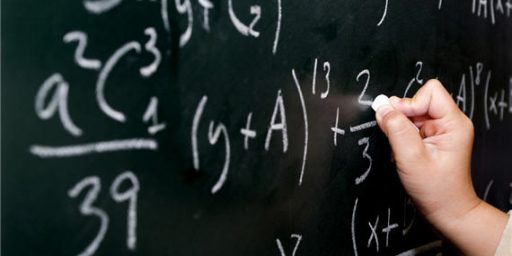Newsflash: Berkeley Sociology Students Publish Crap
Another paper in the “Bush stole the election” theme has been cooked up by 3 U.C. Berkeley graduate students in sociology. The paper uses data from the 2000 Census, and county voting data. The list of variables in the “analysis” is extremely impressive (by the way, that was supposed to be sarcastic).
- number of voters
- median income
- Hispanic population
- change in voter turnout between 2000 and 2004
- support for President Bush in 2000 election
- support for Dole in 1996 election
Of course there is no attempt to account for things like changes in income over time. The only change that is considered is the change in voter turnout, everything else is cross-sectional data. Similarly there is no attempt to control for events like the three hurricanes, the Presidential visits, and that voters might be thinking that it might not be a bad idea if the Governor’s brother is President.
Another potential monkey wrench in the works here is an incumbency effect. Did say…Clinton or Reagan experience increases in support when they ran for a second term. Of course, the paper looks into this…ohhh…wait, no they don’t. But hey, according to the Berkeley Daily Planet, the three grad students have been to the computer labs a dozen times….so clearly the results must mean something.
Also, the claim in the Berkeley Daily Planet that the result is due to chance is one in a thousand is misleading. The claim rests on p-values which are a curious statistical construct. The p-value attempts to condition on the data observed, but at the same time considers data that could have been observed, but wasn’t. Further, when people look at p-values they don’t consider a similar value for the alternative hypothesis. Suppose you have a p-value that is 0.02. That looks pretty good in that it says that the probability that this is due to random chance is 2%. But, suppose under the alternate hypothesis the results lead to a p-value of 0.002? The first p-value is an order of magnitude (10x) more likely than with the alternative. Seems rather silly to reject the null hypothesis in favor of the alternative given these probabilities. Of course, I’d expect a “nationally renowned expert on statistical research” (that would be Prof. Hout) would know this (or maybe not).
This quote will probably break a few ribs,
When the results began to emerge, the student took them to Hout—not only because he’s “one of the leading statistical sociologists in the U.S.,†Mangels said, but also because “he’s known as one of the most skeptical people in the department.†Later the findings were reviewed by half a dozen other Berkeley professors, as well as others at Harvard and other universities, according to Mangels.
“We’ve been back to the lab dozens of times†as the professors suggested additional variables and tests, she said, but “at this point no one can come up with anything else to poke any holes†in their analysis.
Yes, I’m sure the liberal professors at U.C. Berkeley were working really hard to punch a hole in the notion that Bush stole the election. I’m sure none of the professors at Berkeley were sitting around “in a cafe after the election, feeling really frustrated because all these rumors were flying and no one was presenting any really hard evidence.” Nope, I’m sure quite a few of them (2 to be exact) actually aren’t all that upset that Bush won the election.
This quote near the bottom of the article was the best though,
Ted Selker, a former IBM Fellow who is now a professor at the Massachusetts Institute of Technology and MIT director of the Caltech-MIT Voting Technology Project, said he was unimpressed with the Berkeley paper. Noting that it includes no references and that the authors had not observed the Florida balloting first-hand, he said “I just find this paper neither interesting nor believably accurate.â€
Yeah, those professors at Berkeley and Harvard and other places couldn’t find anything, good thing somebody had their brain turned on over at MIT. This paper is simply pure garbage. The first sign was the press conference “announcing” the dubious results. When reading the paper and seeing that they didn’t account for chagnes in other variables, but just one is another sign of crap masquerading as statistics. The next sign was the failure to apply the analysis to other two term Presidents to see if this is part of a pattern. Then there is the assumption that people in different counties have to vote the same. That one is just a hoot. This is almost as good as the statistical “analysis” that looked at voter registration and party affiliation to determine the “expected” democratic vote. Nevermind that in the South being a Democrat and voting Republican is actually quite common in this last election, 2000, and in 1996!
But of course Bush stole the election…because Karl Rove is an evil genius (kind of like Brain from Pinky and the Brain) and we all know that the plans of evil geniuses never go astray, especially since Karl has read the list of The Top 100 Things I’d Do If I Ever Became An Evil Overlord. When are those Democrats going to learn that there is no hope for them? When are they going to realize that Karl Rove really is Emperor Palpatine and everything is going as he has foreseen?






Steve, using facts, logic and reason against Berkley kids will only hurt the brain.
Garbage in Garbage Out. But seriously, this is standard statistics 101 stuff. Surely, there’s enough brainpower around to either support or refute the argument on analytical grounds. What’s the holdup?
So essentially these kids proved that the number of voters registered as Democrats in X County was higher than the number of votes the Democrat candidate received? The logical conclusion was that the Republicans stole Democrat votes?
Oookaaay. If I read this right, this is lame even by conspiracy theory standards.
The Democratic candidate was OWED the votes of the Democrat-registered voters. If he didn’t receive them, there was clearly something unholy at work.
Steve, you’re a bit late to the party on this one. See e.g. here and here.
Chris,
I’m still not sure that there was much analysis of an incumbency effect. For example in looking at 1996, it looks like there was one…for Clinton. The question is do incumbents have some sort of advantage. Seems to me they do. If this is the case than the positive swing for Bush in thosw two counties isn’t all that shocking, IMO.